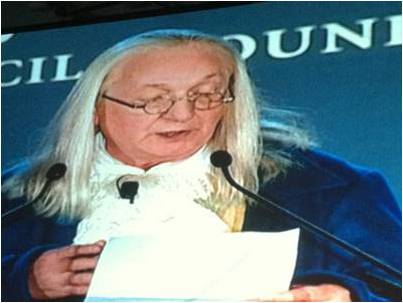Philanthropy411, is currently covering the Council on Foundations conference with the help of a blog team. This is a guest post by Richard Woo, CEO of The Russell Family Foundation
by Richard Woo
 The COF conference’s closing plenary on April 12th was provocatively titled: “Philanthropy on Trial: Innocent or Guilty.” This session was sponsored by Microsoft Community Affairs and introduced by Seattle’s own Akhtar Badshah of Microsoft. Before an audience of a thousand conference attendees a.k.a. “jurors,” the entire field of philanthropy was put on trial, charged with not fulfilling its mission of advancing the common good. Ralph R. Smith, executive vice president of The Annie E. Casey Foundation and former chair of the COF board, served as the defense attorney. Gara LaMarche, president & CEO of The Atlantic Philanthropies represented the prosecution in a mock trial that sought to answer questions such as: Is philanthropy advancing the common good or is it a poor apology for a financial system of great disparities? Are people in the philanthropy world living up to their mission? Is philanthropy really making a difference? A former Pennsylvania Supreme Court Justice, the Honorable Jane Cutler Greenspan acted as the judge. It was a scene straight out of an episode of “Law and Order” or “Judge Judy”!
The COF conference’s closing plenary on April 12th was provocatively titled: “Philanthropy on Trial: Innocent or Guilty.” This session was sponsored by Microsoft Community Affairs and introduced by Seattle’s own Akhtar Badshah of Microsoft. Before an audience of a thousand conference attendees a.k.a. “jurors,” the entire field of philanthropy was put on trial, charged with not fulfilling its mission of advancing the common good. Ralph R. Smith, executive vice president of The Annie E. Casey Foundation and former chair of the COF board, served as the defense attorney. Gara LaMarche, president & CEO of The Atlantic Philanthropies represented the prosecution in a mock trial that sought to answer questions such as: Is philanthropy advancing the common good or is it a poor apology for a financial system of great disparities? Are people in the philanthropy world living up to their mission? Is philanthropy really making a difference? A former Pennsylvania Supreme Court Justice, the Honorable Jane Cutler Greenspan acted as the judge. It was a scene straight out of an episode of “Law and Order” or “Judge Judy”!
I thought it was the most crisply expressed debate on philanthropy’s expectations, accomplishments and disappointments I’ve ever seen on the stage of a COF conference. The prosecution and defense arguments were ironically funny, insightful and impassioned. After the presentation of arguments, a jury of randomly-selected peers from the audience deliberated. The result: a hung jury as to philanthropy’s innocence or guilt. What’s your verdict? Or is the jury still out?
funny, insightful and impassioned. After the presentation of arguments, a jury of randomly-selected peers from the audience deliberated. The result: a hung jury as to philanthropy’s innocence or guilt. What’s your verdict? Or is the jury still out?
If you found this blog post useful, please subscribe. On Twitter? Follow me @Philanthropy411.
Posted by Kris Putnam-Walkerly © Kris Putnam-Walkerly and Philanthropy411, 2010.






